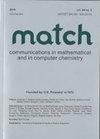ferc - cocl:一种基于多个深度学习算法的鉴定生育相关蛋白的新方法
IF 2.4
2区 化学
Q2 CHEMISTRY, MULTIDISCIPLINARY
Match-Communications in Mathematical and in Computer Chemistry
Pub Date : 2023-07-01
DOI:10.46793/match.90-3.537z
引用次数: 0
摘要
物种的生存取决于生物体的繁殖力。研究能够调节生物体生殖活动的蛋白质也是值得的。由于生物实验很难确认蛋白质,因此开发相关的计算模型来预测生育相关蛋白质的功能已成为当务之急。随着机器学习的发展,相关的各种算法可以成为识别生育相关蛋白的关键。在这项工作中,我们开发了一个基于深度学习的Fer-COCL模型。该模型由多个特征和多个深度学习算法组成。首先,我们利用氨基酸组成(AAC)、二肽组成(DPC)、CTD过渡(CTDT)和二肽与预期均值之间的偏差(DDE)提取特征。之后,将拼接后的特征输入到分类器中。将卷积神经网络与长短期记忆共同处理的数据输入到全连接层进行分类。采用10倍交叉验证对模型进行评估后,两组数据集的准确率分别达到97.1%和98.3%。结果表明,该模型高效、准确,为生物学家研究生物生育力提供了方便。此外,一个预测生育相关蛋白质功能的免费在线工具可在http://fercocl.zhanglab.site/上获得。本文章由计算机程序翻译,如有差异,请以英文原文为准。
Fer-COCL: A Novel Method Based on Multiple Deep Learning Algorithms for Identifying Fertility-Related Proteins
The survival of species depends on the fertility of organisms. It is also worthwhile to study the proteins that can regulate the reproductive activity of organisms. Since biological experiments are laborious to confirm proteins, it has become a priority that develop relevant computational models to predict the function of fertility-related proteins. With the development of machine learning, pertinent various algorithms can be the key to identifying fertility-related proteins. In this work, we develop a model Fer-COCL based on deep learning. The model consists of multiple features as well as multiple deep learning algorithms. First, we extract features using Amino acid composition (AAC), Dipeptide composition (DPC), CTD transition (CTDT) and deviation between the dipeptide and the expected mean (DDE). After that, the spliced features are fed into the classifier. The data processed jointly by convolutional neural network and long short-term memory is input to the fully connected layer for classification. After evaluating the model using 10-fold cross-validation, the accuracy of the two data sets reaches 97.1% and 98.3%, respectively. The results indicate that the model is efficient and accurate, facilitating biologists' research on biological fertility. In addition, a free online tool for predicting the function of fertility-related proteins is available at http://fercocl.zhanglab.site/.
求助全文
通过发布文献求助,成功后即可免费获取论文全文。
去求助
来源期刊
CiteScore
4.40
自引率
26.90%
发文量
71
审稿时长
2 months
期刊介绍:
MATCH Communications in Mathematical and in Computer Chemistry publishes papers of original research as well as reviews on chemically important mathematical results and non-routine applications of mathematical techniques to chemical problems. A paper acceptable for publication must contain non-trivial mathematics or communicate non-routine computer-based procedures AND have a clear connection to chemistry. Papers are published without any processing or publication charge.

 求助内容:
求助内容: 应助结果提醒方式:
应助结果提醒方式:


